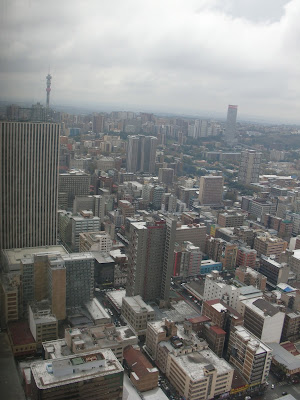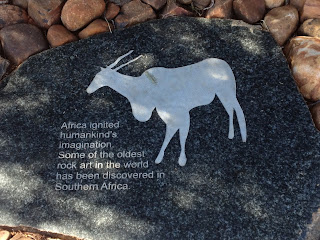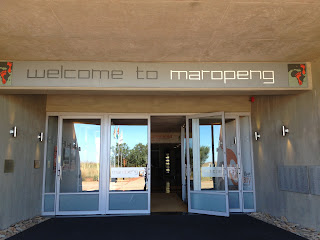After seeing some of the modern renovations of Main Street
we went to the Mai Mai market, seeing the juxtaposition of the modern and
traditional Joburg. The site was first used as a stable to accommodate horses
which were used to pull soil carts back in the 1940s. It was subsequently
converted into a market and became an entry point for newly arrived migrants,
under the custodianship of the old Johannesburg city council. It is the oldest
market dedicated to traditional healing. Many of the shops sell traditional
medicine (muti), masks and furs used during traditional ceremonies, and yet
others cater to tourists.
Visiting traditional African healers is very common in SA. An estimated 60-80% of people consult with healers, often in conjunction with Western medicine. As we walked through the streets of the Mai Mai market, we noted several shops with herbs being left outside to dry.
After leaving the market place we walked to the Carlton center, a large shopping mall, and passed several shops and murals along the way.
 |
| Obviously I am not in the fashion... |

 |
| Mural about the history of Joburg- from the gold rush to apartheid days and the modern city. |
 |
| View of the city from the Carlton center. |
After getting panoramic view from the top of the Carlton center, we visited the worker's museum and learned about the living and working conditions of the people (mostly Africans and Chinese) who worked in the gold mines in the early days of Joburg. These mines are the reason for the city - Joburg is the largest city that was not built surrounding a body of water. We finished the day at the Africa Museum in Newtown, learning a little bit more about the history of the city.

Thanks to our guides Bheki and John for a wonderful time! If you are ever in the area, be sure to look them up.
After our tour ended, we went to constitutional hill, the site of the Old Fort Prison, where many political prisoners (including Gandhi, in 1908) were incarcerated alongside petty criminals and violent offenders. The site is now the seat of the new Constitutional Court of South Africa.


On Saturday night, I went to see Johnny Clegg, a true polymath (a dancer, anthropologist, singer,
songwriter, academic, activist and French knight). Known as the “White Zulu”, he is well known
for penning songs that capture the African spirit and creating a unique musical
style drawn from both European and African traditions. His academic work is
also well regarded; he has published many seminal papers on Zulu music and
dance. During the apartheid years, he used his music to bring greater awareness
of the conditions in SA.
On Sunday, while
Dr. Mandel went to the Joburg market, I went to the "Cradle of
Mankind" to Mebokeng and the Sterkfontein caves, where I relearned the
history of human evolution, saw some of the original fossils found in the area,
and learned that "Mrs. Ples" (the most complete skull of an
Australopithecus africanus specimen ever found in South Africa - found in the
Sterkfontein area) may actually be Mr. Ples.
 |
| Is that a goiter? |
 |
| "Little foot" is still being excavated behind these walls |
 |
| The elephant. Can you make it out - or were we too long underground? |














No comments:
Post a Comment